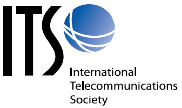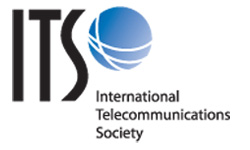Call for Papers
ITS Biennial Conference 2021
Call for Papers

23rd Biennial Conference
Digital societies and industrial transformations: Policies, markets, and technologies in a post-Covid world
21st – 23rd June 2021, Gothenburg, Sweden Over the course of 2020, we have all been affected by Covid. As governments have imposed a series of measures to slow the spread of the virus, many activities have gone online. Not only has working from home and studying online become commonplace, but many individuals have also taken to buying more of their groceries etc electronically. And, of course, we have communicated with friends and family through video conferencing platforms like Zoom.
As we continue to digest the socio-economic impact of Covid, we are also witnessing the start of far-reaching technologically driven change. Big Data and Artificial Intelligence (AI) are beginning to have a significant and widespread impact, from improving healthcare provision and diagnosis to enhancing the liveability of urban areas through smart city initiatives. And the Internet of Things (IoT) is spreading across the economy, collecting ever larger amounts of data that is being analysed to improve sectors as diverse as logistics, retail and manufacturing. This data will provide the basis for entrepreneurial innovative activity, creating new business models and industries and improving existing products and services.
Within the European Union, a lot of hope is being pinned on 5G. Not only will 5G change the mobile telecommunications industry, but it also creates opportunities in other industries. Through facilitating the IoT, 5G could dramatically change other industries – new business models will emerge, the efficiency and effectiveness of existing activities improved and consumers better informed. But this creates far-reaching challenges for mobile operators, who need to invest in a new infrastructure in the context of a changing and more competitive ecosystem. There are also challenges regarding the supply of equipment, reflecting a combination of geo-political tensions, technological change and the lack of competition in some parts of the market. But will these new technologies – 5G, Ai, IoT and Big Data – live up to the great expectations that are being placed on them? What will their impact be, either separately or in conjunction with one another, on the economy? Nascent business models are appearing, raising a number of profound questions in the process. Who will encourage the adoption of these new technologies; will a new and dynamic competitive landscape emerge or will existing actors be able to maintain their market positions? And as these technologies diffuse across the economy, they raise issues regarding their societal impact – will they create new digital divides or exacerbate existing ones, and will some countries benefit the expense of others? More widely, what role will consumers play in the development of the technologies and the markets that they support?
As new business models emerge as the technologies are adopted, what should the regulatory response be? Should regulators be concerned with the ‘winner takes all’ nature of many markets and take appropriate actions, or will technological change and the innovation that accompanies it limit the ability of companies to monopolise markets? Privacy concerns, as well as the accuracy of the data that is collected and analysed, are likely to come to the fore – these issues will be exacerbated by the global nature of the digital economy that is emerging, where Asian equipment companies and US-based content providers are prominent. More broadly technological change questions our understanding of markets across the value chain, and how they should be regulated?
We welcome submissions on the impact of new technologies on regulation, existing business models and how they may change in the years to come and how they may be adopted. In addition, we welcome submissions on a range of topics as outlined below:
- The impact of Covid-19 – on telecommunications networks, different sectors, and users
- Platforms and ecosystems – their scope, regulation and impact
- The scope and character of regulatory regimes
- Monopolisation within high-technology markets – why does it emerge and how should it be regulated?
- Equipment markets – supply chain dynamics, Open RAN and 5G
- The drivers and impact of consolidation in mobile markets
- The relationship between regulation and investment in telecommunication markets
- Operator strategies – bundling, content and convergence
- Innovative ways of providing telecommunications infrastructure in remote and rural areas
- Digital divides – their changing nature and how they can be overcome
- The nature and scope of universal service in a changing telecommunications market
- The role of ICT in addressing and achieving Sustainable Development Goals
- The role of consumers within telecommunications markets
- The socio-economic impact of new technologies (e.g., IoT, AI, blockchain)
- Greening the ICT sector – strategies, regulation and the impact of technological innovation
- The emergence of new innovative business models
- Convergence and bundling – business models, strategies and regulation
- OTT – strategies and impact on the telecommunications sector
- ICT adoption in other sectors – manufacturing, transportation etc.
Submissions addressing any other subject relating to telecommunications technologies and markets are also welcome. Theoretical and empirical papers are welcome, as are methodologically qualitative and quantitative papers.
Important dates:
Submission of abstracts:
Abstracts should be about 2 pages (800 to 1000 words) in length and contain the following information:
- Title of the abstract / panel session
- A clear statement of the research question
- Remarks on the methodology adopted in the paper
- Outline of (expected) results
- Bibliographical notes (up to 6 key references used in the paper)
Abstracts should be submitted via EasyChair.
If you do not already have an account, you will need to create one. Existing accounts can be used to submit your abstract.
Please submit your abstract via:
![]() https://easychair.org/conferences/?conf=its2021
https://easychair.org/conferences/?conf=its2021
ll abstracts will be subject to blind peer review.
Local Organizer
Professor Erik Bohlin
Chalmers University of Technology, Gothenburg, Sweden
erik.bohlin (at) chalmers.se
ITS Europe
Prof. Jason WHALLEY
Northumbria University, Newcastle, UK
jason.whalley (at) northumbria.ac.uk
Dr. Volker STOCKER
TU Berlin and Weizenbaum Institute for the Networked Society, Berlin, Germany
vstocker (at) inet.tu-berlin.de
